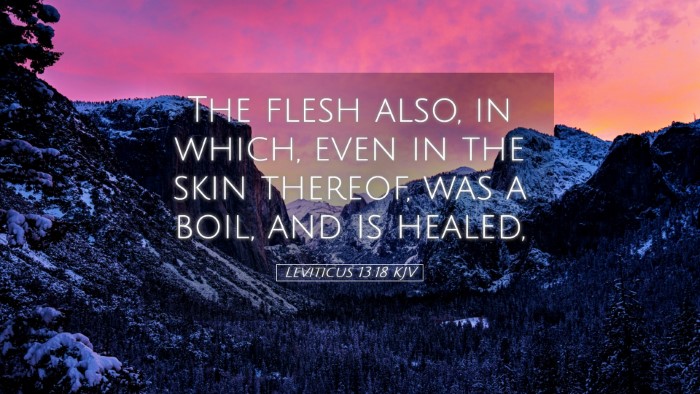Commentary on Leviticus 13:18
Verse Context: Leviticus 13:18 states, "If the flesh on the sore is changed and the sore is healed, then the priest shall examine it." This verse falls within the larger context of the laws governing ceremonial purity, particularly concerning skin diseases and leprosy.
Understanding Leviticus 13:18
This command speaks to the practices associated with holiness, health, and the community's well-being in ancient Israel. It provides insight into how the Israelites approached sickness and disease, emphasizing both the physical and spiritual dimensions of their lives.
1. The Role of the Priest
Matthew Henry underlines the significant role that priests served in examining those afflicted. They acted not only as religious leaders but also as health inspectors, tasked with determining the state of an individual’s disease.
- Authority and Responsibility: A priest's declaration was crucial in either restoring someone to the community or ostracizing them, illustrating the priest's authority in both spiritual and communal matters.
- Symbol of Divine Judgment: The priest's examination also serves as a metaphor for God's judgment and mercy, indicating that healing can lead to restoration and reintegration into the community.
2. The Healing Process
Albert Barnes notes that the healing of the sore indicates a process that parallels spiritual healing. The implication is that physical ailments can serve as a reminder for deeper moral and spiritual reflection.
- Physical vs. Spiritual Healing: The shift from a sore to healing signifies restoration that goes beyond the physical condition, prompting individuals to contemplate the state of their soul before God.
- Community Implications: The healed individual would need to be reinstated to avoid social stigma, which reinforces the need for community support in spiritual healing.
3. Symbolism of the Sore and Healing
Adam Clarke expounds upon the symbolism present in this passage. The physical sore can be related to moral and spiritual maladies present within the community.
- Type of Sin: The nature of the sore could reflect sin within individuals, hinting that moral failings can take a toll on physical health.
- Divine Compassion: The healing indicates God’s willingness to restore those who repent and seek restoration, emphasizing His grace.
4. The Significance of Examination
The necessity for the priest to examine the sore is critical. It was not enough for the individual to declare themselves healed; a priest's examination ensured that the restoration was legitimate.
- Accountability: This requirement creates a system of accountability, reminding believers that they must be honest about their spiritual condition, and involve others in their healing journeys.
- Community and Faith: The communal aspect emphasizes the importance of shared faith experiences, where individuals are encouraged to seek help from the church and its leaders.
5. Lessons for Today
Leviticus 13:18 can be applied to modern-day contexts in several important ways, especially for pastors, students, and theologians.
- Holistic Healing: The integration of physical, emotional, and spiritual health reflects a holistic approach that parallels many contemporary approaches to healthcare and pastoral care.
- Examinations of Faith: Just as the priest examined the sore, believers today are encouraged to regularly assess their spiritual health in community settings through confession and fellowship.
- Restoration Through Grace: The passage ultimately teaches that healing and restoration are possible through God’s grace, no matter the severity of the ailment—physical or spiritual.
Conclusion
In summary, Leviticus 13:18 serves as a poignant reminder of the interconnectedness of body, soul, and community in establishing holiness and health. As we reflect on this passage, let us consider the nature of our own spiritual wounds and the importance of seeking restoration in fellowship with God and one another.


